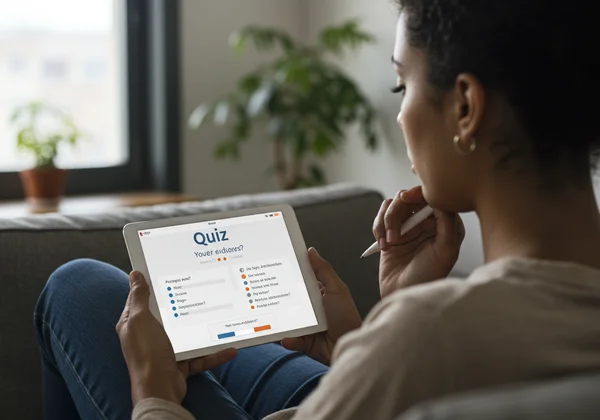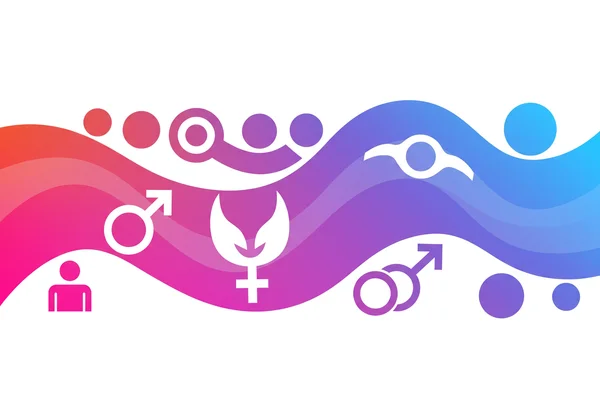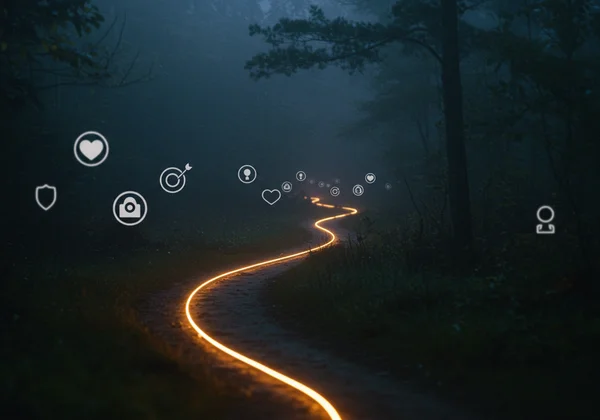Bisexual vs. Gay: Explore Your Sexuality with Our Quiz
July 27, 2025 | By Isla Dawson
Feeling confused about your attractions is a deeply human experience. Many people find themselves wondering about the nuances of their feelings, asking questions like, "What's the difference between being gay and bisexual?" This is a common and valid part of exploring your identity. You are not alone on this journey. This guide is here to offer clarity on the differences and similarities, helping you understand your unique feelings in a safe and non-judgmental space.
The path to self-understanding is personal and takes courage. Tools designed for reflection can be a helpful first step. If you're looking for a starting point, an interactive gay quiz can provide a framework for your thoughts. You can start your journey of discovery with our free and confidential quiz designed to help you reflect on your attractions.

Bisexual vs. Gay: Understanding the Core Differences
When we talk about "bisexual vs. gay," we're really talking about finding the words that resonate most with your unique inner world. Both are beautiful, valid ways of experiencing attraction, yet they describe distinct patterns of connection. Understanding these definitions can be an empowering step in claiming your identity.
What Defines Being Gay? Same-Gender Attraction Explained
Being gay generally means you experience enduring romantic, emotional, and/or sexual attraction primarily to people of the same gender. For a man, this means being attracted to other men. For a woman, who may also use the term lesbian, this means being attracted to other women. This is a core aspect of same-gender attraction.
It's more than just a fleeting thought; it's a consistent pattern of who you envision as a partner, who you connect with emotionally, and who you are drawn to romantically. Understanding this is fundamental to grasping your personal sexual orientation.
Exploring Bisexuality: Attraction to More Than One Gender
Bisexuality is defined by the potential for attraction to more than one gender. This means a bisexual person can be attracted to people of their own gender and people of other genders. It is a wonderfully fluid identity. A common misconception is that this attraction must be a perfect 50/50 split, but that's rarely the case.
A person's bisexual identity might mean they are more attracted to one gender than another, or that their attractions shift over time. The key element is the capacity for multi-gender attraction. This orientation validates the experience of feeling drawn to different kinds of people throughout your life. It's a spectrum of feelings, not a rigid box.

Navigating Romantic, Sexual, and Emotional Attraction
To add another layer of self-understanding, it helps to see that attraction isn't a single feeling. It can be broken down into different types:
- Sexual Attraction: The desire for physical intimacy with another person.
- Romantic Attraction: The desire for a romantic relationship with another person, involving emotional connection and partnership.
- Emotional Attraction: A deep connection with someone on an intellectual or emotional level, which may or may not be romantic or sexual.
Sometimes these align perfectly, but for many people, they don't. You might be sexually attracted to one gender but romantically attracted to another. Recognizing these nuances is crucial because it gives you more specific language to understand yourself. You can explore these feelings further with tools designed for self-reflection.
Common Misconceptions About Bisexuality & Gay Identity
Myths and stereotypes can make the journey of self-discovery even more confusing. Let's clear up some of the most common ones. By debunking these, we create more space for authentic understanding and self-acceptance.
Debunking "Just a Phase" Myths for Bisexuals
One of the most persistent and harmful myths is that bisexuality is "just a phase" on the way to being gay or straight. This is false. For countless people, bisexuality is a stable and lifelong identity. A bisexual person in a relationship with someone of the same gender is still bisexual, just as they are if they're in a relationship with someone of a different gender. Their identity doesn't change based on their partner.
Is It Normal to Question My Sexuality, Even if I've Only Liked One Gender?
Yes, it is completely normal. Questioning sexuality is a sign of introspection and self-awareness. Many people who later identify as gay, bisexual, or another identity spent years only recognizing attraction to one gender, often due to social expectations. Allowing yourself to question these feelings is a healthy and brave step toward understanding your true self. Our experiences are shaped by our environment, and exploring what lies beneath the surface is part of the human experience.
The Fluidity of Sexuality: Understanding Your Evolving Feelings
The concept of sexual fluidity is a key insight from psychology. It acknowledges that for some people, sexual attractions and identity can change over time. This doesn't invalidate your past feelings or your current ones. It simply means that you are a dynamic, evolving person. Embracing this possibility can relieve the pressure to find one single, permanent label. The goal is to understand how you feel now, and our sexuality quiz can be a great resource for that.

Am I Bisexual, or Am I Gay? Signs to Consider
There is no external checklist that can definitively tell you your sexual orientation. That answer can only come from within. However, asking yourself certain questions can help illuminate your feelings. Think of these as prompts for your journal or quiet moments of reflection. This isn't a test, but a gentle guide for introspection.
Signs You Might Be Primarily Attracted to the Same Gender
If you're wondering if you might be gay, consider these points for reflection:
- When you imagine your ideal romantic future, is your partner consistently someone of the same gender?
- Do you find yourself developing deep emotional connections or crushes primarily on people of your gender?
- Do movies, books, or songs about same-gender couples resonate with you on a deep, personal level?
- Are your most persistent sexual fantasies centered around people of the same gender?
Signs You Might Experience Multi-Gender Attraction
If you're exploring whether you might be bisexual, reflect on these questions:
- Have you experienced significant romantic or sexual crushes on people of different genders?
- When you think about your past attractions, can you identify genuine feelings for both people of your gender and other genders?
- Do you feel that limiting your potential for partnership to just one gender would feel incomplete or inauthentic to you?
- Does your attraction feel dependent on the person's personality, connection, and energy, rather than their gender alone?
Trusting Your Inner Compass: No Rush to Label Yourself
Ultimately, this journey is yours alone. There is no timeline or deadline for figuring it out. Labels like "gay" and "bisexual" are tools to help us understand ourselves and find community, not rigid boxes we must force ourselves into. Be patient and kind to yourself through this process of self-discovery. If you're looking for a gentle way to organize your thoughts, an LGBTQ quiz can help you see patterns in your responses and find some clarity.
Your Next Steps in Identity Exploration: Embrace Your Journey
Understanding the difference between being gay and bisexual is a significant step, but it's just one part of a larger, beautiful journey of self-discovery. Remember that questioning is normal, your feelings are valid, and you deserve to explore your identity in a way that feels safe and affirming. The most important thing is to be compassionate with yourself as you navigate these complex emotions.
This journey is about understanding, not performance. You don't owe anyone a label or an explanation until you are ready. Ready to take a gentle, insightful step forward? Take our free gay quiz today. It’s a completely anonymous and private tool designed to help you reflect on your feelings and gain personalized insights to support your exploration.
Frequently Asked Questions About Bisexuality & Gay Identity
What's the difference between being gay and bisexual?
The main difference lies in the scope of attraction. Being gay refers to attraction primarily to people of the same gender. Bisexuality refers to the potential for attraction to people of more than one gender. Both are whole and valid sexual orientations.
Can someone be "a little bit" gay or bisexual?
Absolutely. Sexuality is often viewed as a spectrum rather than a set of rigid categories. Some people feel predominantly attracted to one gender but acknowledge a smaller degree of attraction to another. Your unique experience is valid, and you don't have to fit perfectly into any single definition.
Is it normal to question my sexuality?
Yes, it is incredibly normal and healthy. Questioning your sexuality is a sign of self-awareness and a natural part of personal growth for many people, regardless of their age or previous experiences. It's an opportunity to connect more deeply with your authentic self.
Can a gay quiz help me understand if I'm bisexual or gay?
A quiz should be seen as a tool for self-reflection, not a final diagnosis. It can't tell you who you are, but it can help you explore your own feelings by asking questions you may not have considered. Our am i gay test is designed to provide a starting point for this reflection in a safe, non-judgmental way.
What if I still feel confused after reading this?
That is completely okay. Self-discovery is a process, not a destination. Be patient with yourself. Continue to learn, reflect, and maybe talk to a trusted friend or a professional if you feel comfortable. There is no rush, and your journey is unfolding at its own perfect pace.